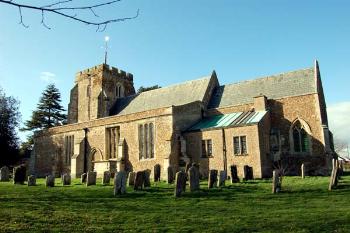
Roxton church from the south-east March 2007
Volume 81 published by Bedfordshire Historical Records Society (2002) is a series of episcopal visitations undertaken in the first twenty years of the 18th century, edited by former County Archivist Patricia Bell. At each visitation a list of questions was sent out in advance, one of which enquired about the provision of schools in each parish. In 1706, 1709 and 1717 the Vicar reported that there was no parish school though in 1717 he wrote: "I teach a private school and endeavour to instruct those that are committed to my care in the principles of the Church of England".
In 1818 a Select Committee was established to enquire into educational provision for the poor. This was no doubt prompted, in part, by the recent foundation of two societies promoting education and specifically the building of schools. The Society for Promoting the Lancasterian System for the Education of the Poor was established in 1808 promoting schools run along the lines pioneered by Joseph Lancaster, who had himself copied those of Dr. Andrew Bell, in which older children taught their younger fellows. The Society was renamed the British and Foreign School Society in 1814,. It was supported by a number of prominent nonconformists, Lancaster himself was a Quaker, and sought to teach a non-sectarian curriculum. In answer to this perceived nonconformist takeover of local education the National Society was firmed in 1811 to encourage the teaching of poor children along Anglican lines, including the catechism. The Select Committee sent a questionnaire to all parishes in the country asking for: particulars relating to endowments for the education of children; other educational institutions; observations of parish needs etc. J. Clarkson, Vicar of Great Barford and Roxton, stated in the return for Roxton that: "The poor under 16 years of age are chiefly indebted to Dissenters and Methodists for education; and the minister is endeavouring to establish a Sunday school, as there are 60 children in need of instruction". In those days a Sunday School was just that, a school which met on a Sunday, usually in the church or nonconformist chapel or other similar building, teaching more than the religious topics with which they are associated today.
In the country generally the number of schools built continued to grow over the next fifteen years so that by 1833 the government agreed to supplement the work of the two societies, and local benefactors, by making £20,000 per annum available in grants to help build schools. It also prompted another questionnaire to be sent to each parish in England asking for details of local educational provision. Congregationalism was strong in Roxton, encouraged by the Metcalfe family who owned the Roxton Estate. The 1833 return states that there was a Congregational Infant school, which was attended by 27 children. A Congregational daily school had been started that year and taught 48 children, of whom 17 boys also attended in the evenings in the winter. The schools were supported by donations as well as payments from parents. There were also two Sunday schools – the Church of England school taught 30 boys; and the Congregational was attended by 42 boys and 80 girls. Both Sunday schools were supported by voluntary contributions. 43 children in the Day and Infant schools also attended the Sunday schools.
In 1836 a grant of £50 was made by the British and Foreign Schools Society for a new school at Roxton to accommodate 100 children, this was to replace the barn in which the Congregationalist school was held.
The next national enquiry was in 1846/7 when the Church of England made an enquiry as to all its church schools. This was against the background of a new Whig government which championed secular education and the increasing importance of nonconformists, particularly Wesleyan Methodist, and Roman Catholics in providing schools. The Roxton return recorded that there was no church school or Sunday School in the parish. In 1847 a directory states that the British School had fees of 1d to 3d a week according to the nature of the tuition. There is no further mention of this school which seems to have ceased to exist around the time when the National School finally opened in 1860.